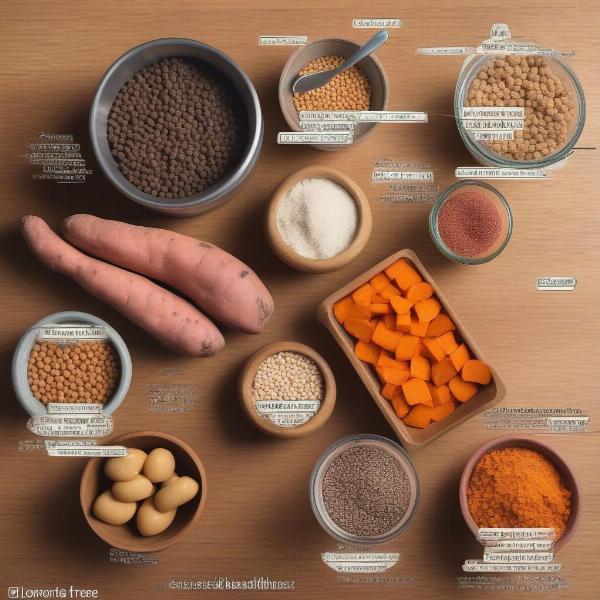Grain-free dog food has become increasingly popular in recent years. But is it the right choice for your canine companion? This comprehensive guide will explore the benefits and potential drawbacks of grain-free diets, helping you make an informed decision for your dog’s health and well-being. We’ll delve into the ingredients, the dogs who might benefit most, and what to look for when choosing a grain-free dog food.
Understanding Grain-Free Dog Food
What exactly does “grain-free” mean? Simply put, grain-free dog food doesn’t contain grains like wheat, corn, rice, barley, or rye. These are often replaced with alternative carbohydrates such as potatoes, sweet potatoes, peas, lentils, or tapioca. Many pet owners choose grain-free options believing them to be more natural and closer to a dog’s ancestral diet. However, it’s essential to understand that dogs have evolved to digest carbohydrates, and grains themselves are not inherently bad.
 Grain-Free Dog Food Ingredients
Grain-Free Dog Food Ingredients
Is Grain-Free Dog Food Right for Your Dog?
While some dogs thrive on grain-free diets, it’s not a one-size-fits-all solution. Dogs with grain allergies or sensitivities may experience improvements in skin and coat health, as well as reduced digestive issues, when switched to a grain-free diet. However, for dogs without these issues, a balanced diet containing grains can be perfectly healthy.
Identifying Grain Allergies in Dogs
How can you tell if your dog has a grain allergy? Common symptoms include itchy skin, excessive licking or scratching, ear infections, and gastrointestinal problems. If you suspect your dog has a grain allergy, it’s crucial to consult with your veterinarian for a proper diagnosis and dietary recommendations.
Choosing the Best Grain-Free Dog Food
The pet food market is flooded with grain-free options, making it challenging to choose the best one for your furry friend. Look for high-quality ingredients, including a good source of animal protein as the first ingredient. Avoid artificial colors, flavors, and preservatives. grain free dog food beef is a popular choice for many dog owners.
Reading Dog Food Labels
Understanding dog food labels is essential for making informed choices. Pay attention to the guaranteed analysis, which lists the minimum percentages of protein, fat, and fiber. wheat and grain free dog food often feature alternative carbohydrate sources, so look for those listed clearly. Also, check for the AAFCO statement, ensuring the food meets nutritional requirements for your dog’s life stage.
Potential Risks of Grain-Free Diets
While grain-free diets can be beneficial for some dogs, it’s important to be aware of potential risks. In recent years, the FDA has investigated a potential link between grain-free diets and dilated cardiomyopathy (DCM) in dogs. wellness grain free dog and other brands are subject to ongoing research in this area. It’s crucial to discuss any dietary changes with your veterinarian, especially if you have concerns about DCM.
Conclusion
Grain-free dog food can be a healthy option for dogs with grain allergies or sensitivities. However, it’s not a necessity for all dogs, and careful consideration is needed. By understanding your dog’s individual needs and choosing a high-quality grain-free dog food, you can help ensure they receive the optimal nutrition for a long and healthy life. Remember to consult with your veterinarian before making any significant dietary changes. langhams grain free dog food is another option you might consider discussing with your vet.
FAQ
- Is grain-free dog food better than regular dog food? Not necessarily. It depends on your dog’s individual needs.
- What are the signs of a grain allergy in dogs? Itchy skin, excessive licking, ear infections, and digestive issues can be signs.
- Are there any risks associated with grain-free dog food? The FDA is investigating a potential link between grain-free diets and DCM in some dogs.
- What should I look for when choosing a grain-free dog food? High-quality ingredients, animal protein as the first ingredient, and no artificial additives.
- Should I talk to my vet before switching my dog to a grain-free diet? Yes, it’s always best to consult with your veterinarian before making significant dietary changes. merrick grain free dog food is one of the many options you could discuss.
- What are some common grain-free alternatives? Potatoes, sweet potatoes, peas, lentils, and tapioca are often used.
- Can puppies eat grain-free dog food? There are grain-free puppy formulas available, but consult your vet for the best option.
ILM Dog is a leading online resource dedicated to providing expert advice on dog care, breeds, health, training, and nutrition. We offer comprehensive guides and resources to help you navigate every aspect of dog ownership. From choosing the right breed to understanding your dog’s dietary needs, we’re here to help. Contact us for expert advice: Email: [email protected], Phone: +44 20-3965-8624. ILM Dog is committed to helping you provide the best possible care for your canine companion.